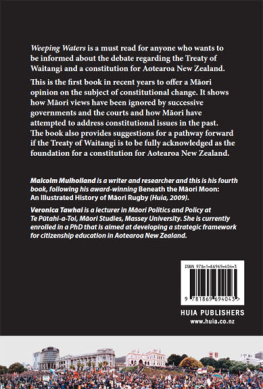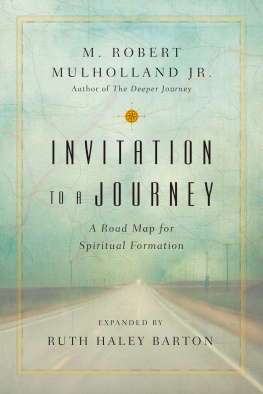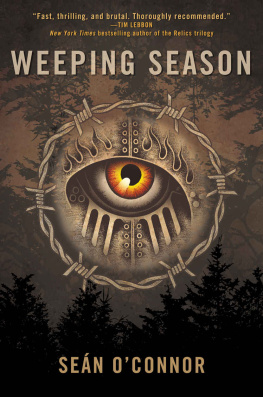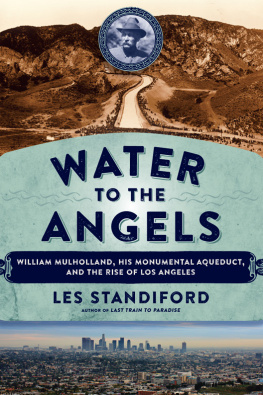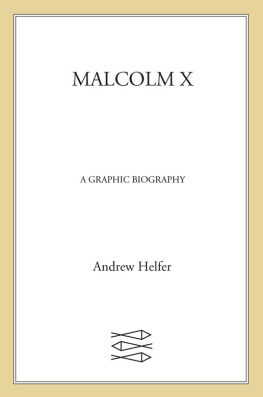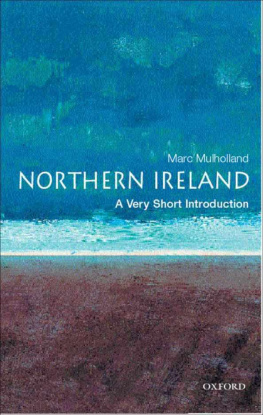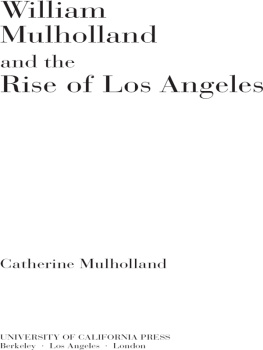Malcolm Mulholland - Weeping Waters
Here you can read online Malcolm Mulholland - Weeping Waters full text of the book (entire story) in english for free. Download pdf and epub, get meaning, cover and reviews about this ebook. publisher: Huia (NZ) Ltd, genre: Politics. Description of the work, (preface) as well as reviews are available. Best literature library LitArk.com created for fans of good reading and offers a wide selection of genres:
Romance novel
Science fiction
Adventure
Detective
Science
History
Home and family
Prose
Art
Politics
Computer
Non-fiction
Religion
Business
Children
Humor
Choose a favorite category and find really read worthwhile books. Enjoy immersion in the world of imagination, feel the emotions of the characters or learn something new for yourself, make an fascinating discovery.
- Book:Weeping Waters
- Author:
- Publisher:Huia (NZ) Ltd
- Genre:
- Rating:4 / 5
- Favourites:Add to favourites
- Your mark:
- 80
- 1
- 2
- 3
- 4
- 5
Weeping Waters: summary, description and annotation
We offer to read an annotation, description, summary or preface (depends on what the author of the book "Weeping Waters" wrote himself). If you haven't found the necessary information about the book — write in the comments, we will try to find it.
Weeping Waters — read online for free the complete book (whole text) full work
Below is the text of the book, divided by pages. System saving the place of the last page read, allows you to conveniently read the book "Weeping Waters" online for free, without having to search again every time where you left off. Put a bookmark, and you can go to the page where you finished reading at any time.
Font size:
Interval:
Bookmark:
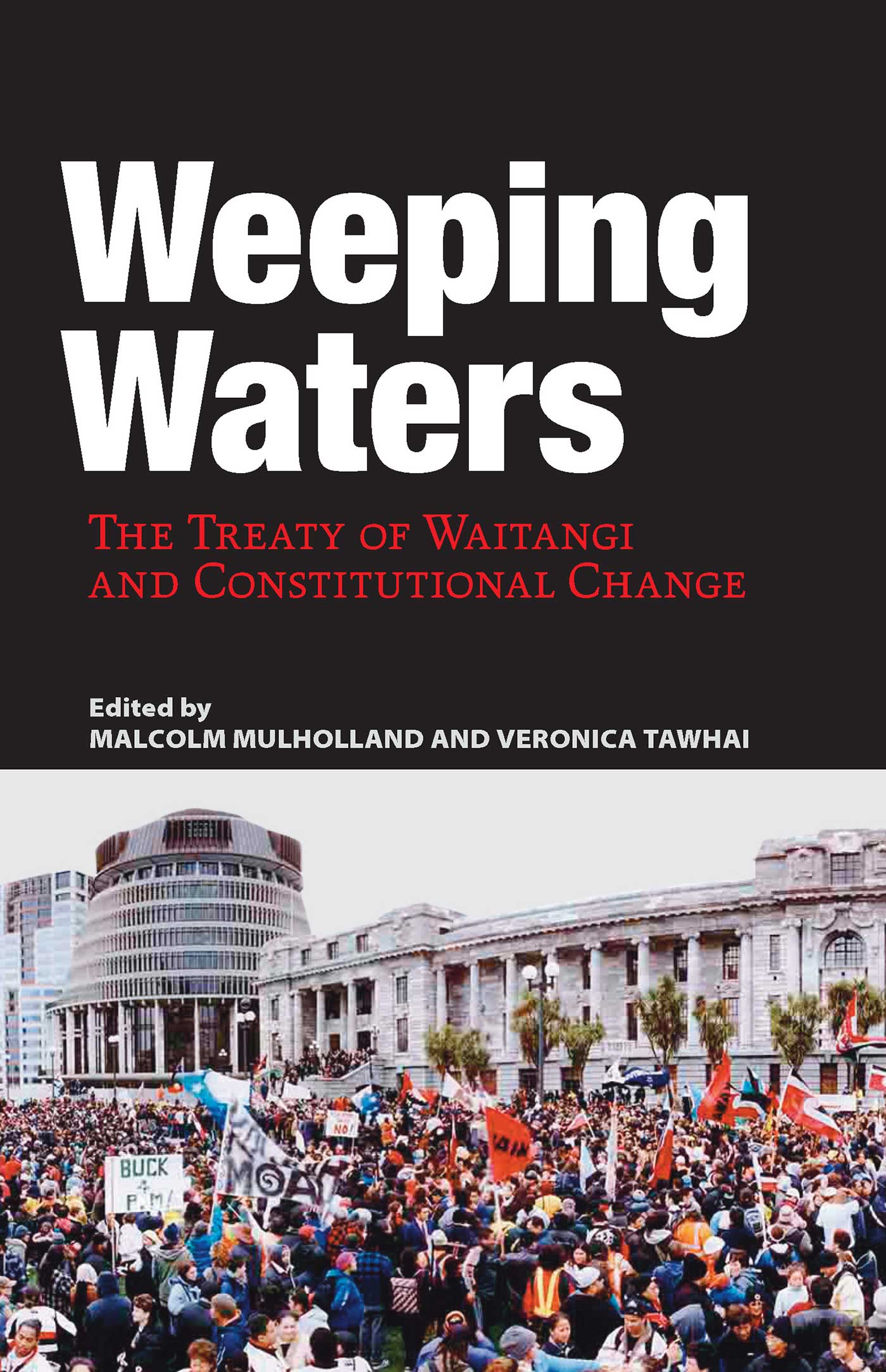
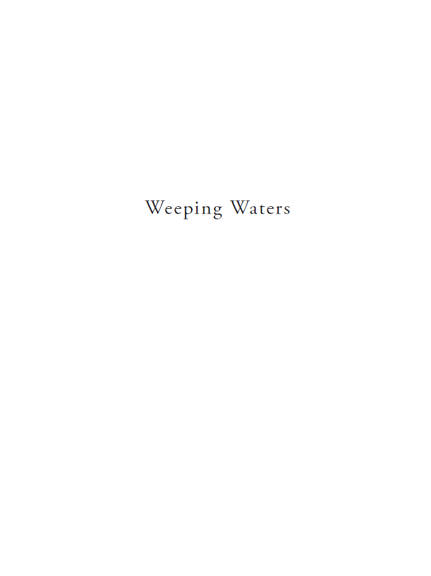

First published in 2010 by Huia Publishers
39 Pipitea Street, PO Box 17335
Wellington, Aotearoa New Zealand
www.huia.co.nz
ISBN 978-1-86969-404-3 (print)
ISBN 978-1-77550-338-5 (EPUB)
ISBN 978-1-77550-339-2 (Kindle)
Copyright the authors 2010
Cover image: Clayton Tume
All rights reserved. No part of this publication may be reproduced, stored in a retrieval system, or transmitted in any form or by any means, electronic, mechanical, including photocopying, recording or otherwise, without prior permission of the publisher.
National Library of New Zealand Cataloguing-in-Publication Data
Weeping waters : the Treaty of Waitangi and constitutional change/edited by Malcolm Mulholland and Veronica Tawhai.
Includes bibliographical references and index.
ISBN 978-1-869694-04-3
1. Treaty of Waitangi (1840) 2. Constitutional lawNew Zealand.
[1. Tiriti o Waitangi. reo 2. Ture. reo] I. Mulholland, Malcolm, 1976- II. Tawhai, Veronica M. H.
342.93dc 22
Published with the support of Ng Pae o te Mramatanga

Ebook conversion 2017 by meBooks
E aku nui, e aku rahi, tn ttou katoa. Tn ttou i roto i ng tini huatanga e p mai nei ki a ttou. Tn hoki ttou i ttou mate rtou i tuku mai te tino rangtiratanga hei oranga m rtou uri, m ttou i nei r, i runga i te mata o ttou whenua i roto i tnei ao hurihuri. N reira, tukuna rtou kia okioki, rtou ki a rtou, ttou ki a ttou. Ka tika m ttou e manaaki aua kkano kua ruia hei tutukinga m ttou tamariki mokopuna.
N reira, ki a koutou i takoha mai ki te pukapuka nei, ng kupu krero, ng akoranga nui, ng whakaaro purapura hei whaitanga m te hunga e matekai nei ki t ttou rangatiratanga, nei r te mihi.
E ttou, kia , kia mia!
It seems to me that there is nothing particularly broken about the way our arrangements work at present, but they are quaint.
Prime Minister Helen Clark,
Building the Constitution Conference, 2000
If there is one theme to clearly emerge from this collection of chapters, it is that all arrangements that form any sense of a constitution for Aotearoa New Zealand do not meet Mori expectations that stem from the Treaty of Waitangi. Former Prime Minister Helen Clark is wrong in her assumption that the foundation of Aotearoa New Zealand is solid; in fact for Mori, the Treaty of Waitangi has been severely neglected as the cornerstone of a constitution for this country.
The title of this book is one translation of Waitangi: tangi being to weep, wai being water. It seems somewhat prophetic that the founding document of this country should have been first signed at a place that means weeping waters. The 6th of February 1840 was to mark a downward spiral for Mori, a loss of political autonomy that would result in the tangata whenua being culturally, socially and economically bereft in their own lands.
Yet all is not lost. The Treaty of Waitangi provides a basis for moving forward as a nation; it is as relevant today as it was 170 years ago. For many contributors to this book, the Treaty is about the distribution of power between the two signatories. Despite the erosion of Mori authority over their own affairs and a changing political landscape that may lead some towards the proposition that things have never been better for Mori, a revolution constitutionally is always possible. A revolution is required, to give justice to our founding fathers who put their name in ink on the founding document of this country.
The motivation for publishing this book comes from two sources: firstly, the need for a Mori opinion to be articulated and distributed among those who are interested. In recent years, there have been several books on the subject penned by Pkeh authors. While Pkeh opinion is important in terms of the Treaty, equally as important is what the tangata whenua think about the Treaty. Secondly, this year, 2010, marks 170 years since the signing of the Treaty, and is a watershed moment in time to revisit constitutional issues and the place of the Treaty.
On reflection, small gains have been made over the past forty years regarding Mori development. Yet there is still a long path to travel should we as a country want to fully realise the potential of the Treaty.
The starting point in a discussion about what a new constitution for Aotearoa New Zealand might look like is to define what a constitution is. As Moana Jackson argues, as soon as the word constitution is used, Mori instantly speak within the confines of a foreign concept. Jackson encourages Mori to think in terms of what they know. Thus, perhaps the closest concept Mori have regarding a constitution might be kawa, or Mori law. This is a useful starting point, as Mori are aware of kawa for the marae that dot the landscape. How might those rules and values be extended within and applied to our society? This is where the discussion should begin for Mori.
There is no one written constitution for Aotearoa New Zealand. It is accepted that there is a collection of documents and conventions that form the constitution that governs the nation. Documents include the Treaty of Waitangi, various statutes with constitutional significance, such the Constitution Act 1986 and the Electoral Act 1993, and the decisions of the courts. Conventions include the prerogative powers of the Queen and rules that dictate how institutions of government work. The constitution that Aotearoa New Zealand has inherited originates from Mother Britain, supposedly from Mori agreeing to allow non-Mori onto their lands under the Treaty of Waitangi. The Queen or King of England reigns supreme as the Aotearoa New Zealand head of state. The Monarchy is represented within Aotearoa New Zealand by the Governor General.
At present, the focus of constitutional change appears to be for Aotearoa New Zealand to become a republic. Should this occur, the Queen would be abandoned as the head of state, thus making the position of Governor General redundant. The wider debate surrounding the place of the Treaty of Waitangi, should this country no longer be a member of the Commonwealth, would then focus on what that would mean in terms of the relationship between the Crown and Mori. The Monarchy has had very little to do with governance in Aotearoa New Zealand. If anything, their most lasting legacy was to delegate authority to the British Parliament, who, in turn, delegated their authority to the current New Zealand Government.
If we accept this as being the case, and one would assume that we do, given the role that successive governments have played in apologising to Mori regarding Treaty claims, then it can be argued that the Treaty partners are Mori and the New Zealand Government. This concept forms a starting point for the discussions contained within the individual chapters of this book.
Each chapter within this book is placed under one of three themes, as follows.
Part One: Evolution begins with a fresh look at the Treaty of Waitangi text. It then looks at government institutions, our Pacific neighbours and historical Mori responses to the evolution of a constitutional framework for Aotearoa New Zealand.
Font size:
Interval:
Bookmark:
Similar books «Weeping Waters»
Look at similar books to Weeping Waters. We have selected literature similar in name and meaning in the hope of providing readers with more options to find new, interesting, not yet read works.
Discussion, reviews of the book Weeping Waters and just readers' own opinions. Leave your comments, write what you think about the work, its meaning or the main characters. Specify what exactly you liked and what you didn't like, and why you think so.

